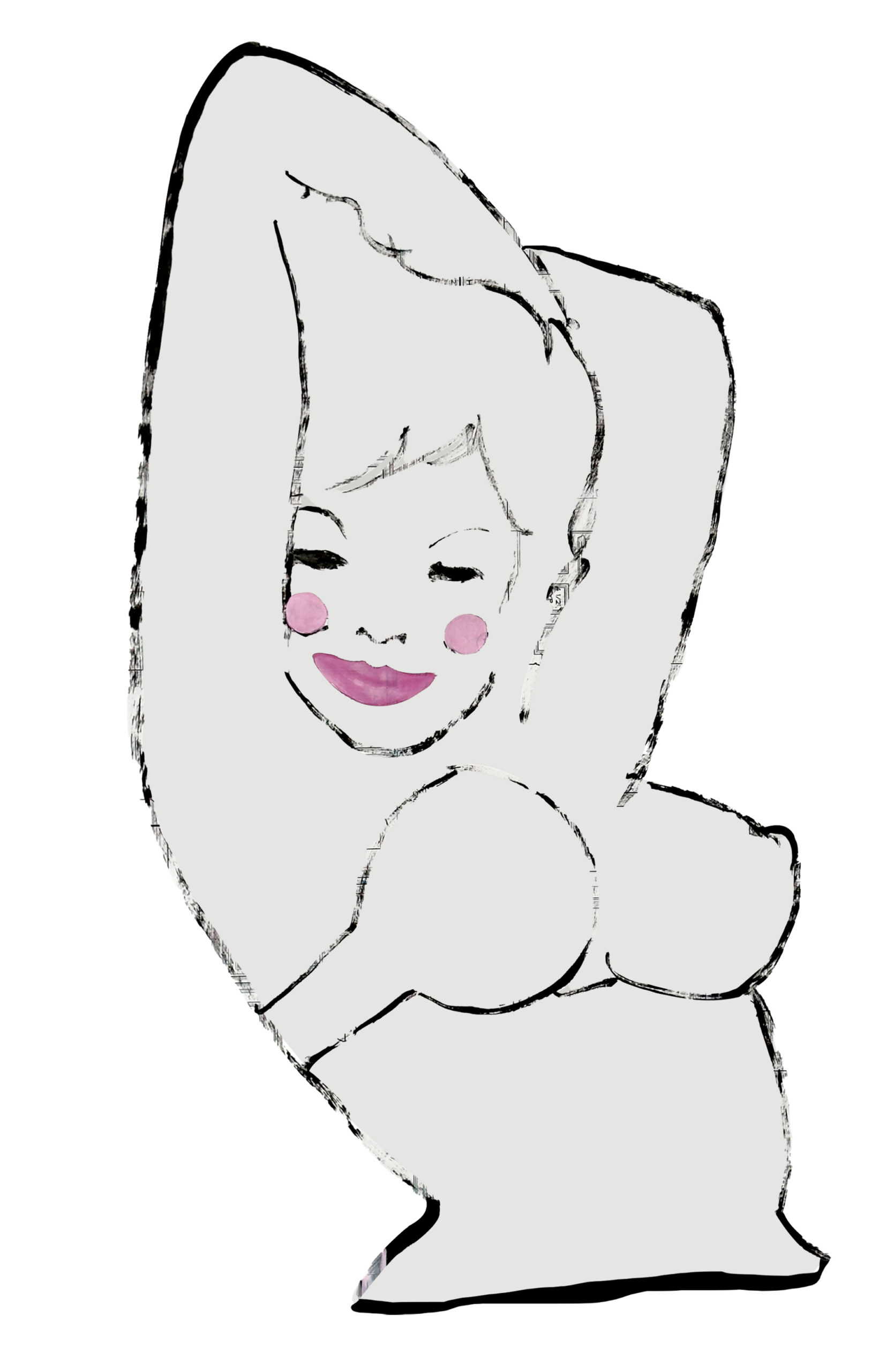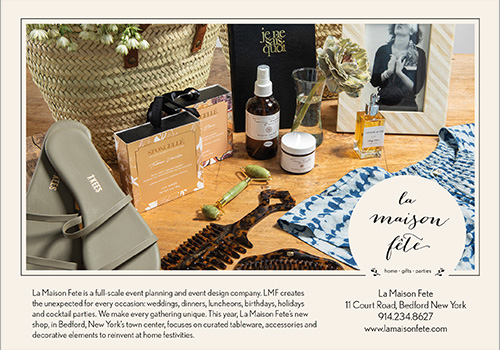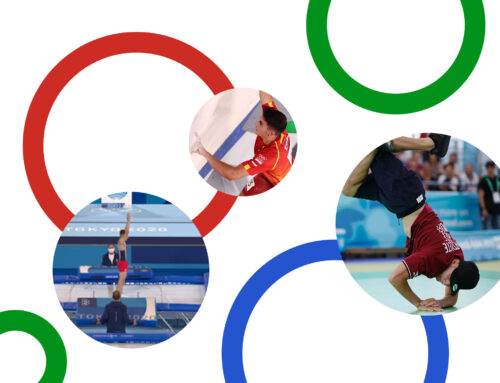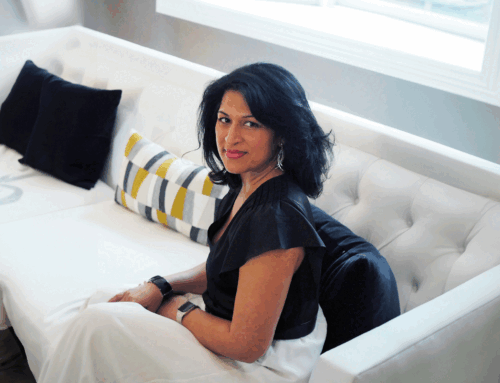By Cathy Deutsch
Artwork by Jennie Carr
Dr. Corinne Menn recently co-led a four-day medical cruise for women and their partners. Over 150 men and women attended, all there to learn about a topic everyone—from Salma Hayek and Michelle Obama to Naomi Watts and Oprah—is talking about: how best to navigate the recent changes in their relationships. The couples expressed equal concern, and they were eager to help make this difficult transition a little less challenging.
The topic? Menopause.
Menn, a Chappaqua-based, board-certified OB/GYN and member of The North American Menopause Society, devotes her practice to the care of women experiencing symptoms related to peri- through postmenopause.
“Only 12 of 177 (6.8 percent) [of surveyed residency trainees] reported feeling adequately prepared to manage women experiencing menopause,” says Menn, citing research from 2019.
The cruise, which Menn co-led with noted women’s health physician Dr. Mary Claire Haver and other specialists, touched on numerous topics related to the challenges a woman experiences during this time of change.
“The men on board were amazing,” says Menn. “They were so interested in the information and eager to be a part of the process. This kind of physical and emotional dysregulation not only affects women but also the men or partners they live with. A relationship can often struggle during this transition, and it’s wonderful when men participate.”
Menopause is the new “it” topic. The conversations are everywhere, and women, along with their spouses and even their children, are finally learning how to manage the symptoms that naturally occur with age.
Why change is needed
For decades (and likely forever), the list of women’s ailments has been as long as a CVS receipt. There’s everything from the well-known hot flashes, night sweats and weight gain to the less-talked-about fatigue, insomnia, mood changes, joint pain and brain fog. And then there are the often-whispered complaints of loss of libido, vaginal dryness, repeat UTIs, hair loss and more. These symptoms, which vary from one person to another, all mean one thing: a general decreased quality of life.
No wonder an undereducated medical community called it hysteria, and not so long ago, they performed hysterectomies as the only way to address these symptoms. (Side note: This didn’t work because natural, age-related hormone dysregulation cannot be fully resolved with surgery.)
For women who don’t have a major organ (and, often, related organs) removed, they are typically advised to take antidepressants, which do not solve the problem, either; instead, these treatments foster “shame and embarrassment,” according to Menn and countless other medical and psychological advocates for women’s health across the globe.
But change is beginning to occur. On March 18, President Biden issued an executive order that will, according to The White House, “direct the most comprehensive set of executive actions ever taken to expand and improve research on women’s health. These directives will ensure women’s health is integrated and prioritized across the federal research portfolio and budget, and will galvanize new research on a wide range of topics, including women’s midlife health.”
This order includes an effort led by the National Institutes of Health to direct $200 million towards new, interdisciplinary women’s health research in the fiscal year 2025. The plan also includes “more than twenty new actions and commitments by federal agencies,” and, according to The White House, it’s the “most comprehensive set of executive actions ever taken to expand and improve research on women’s health.”
In 2023, the President and the First Lady also launched the White House Initiative on Women’s Health Research, a first-of-its-kind endeavor “to fundamentally change how we approach and fund women’s health research in the United States.”
How did this topic become so popular?
Today, according to the Mayo Clinic, an estimated 6,000 women daily and more than two million women annually reach menopause in the U.S. And as our population ages, the number of postmenopausal women is expected to rise to 1.1 billion worldwide by the year 2025.
According to a recent article in Time Magazine, “more than half a billion dollars were invested into menopause startups in recent years based on what analysts project as a major opportunity to make money.” In fact, this very topic is expected to be a $600 billion industry by 2025.
There’s also the previously-mentioned Women’s Health Initiative, co-founded by Jill Biden and Maria Shriver, that supports heart health, pregnancy and menopausal studies. A key piece of this initiative is a push to use women as the control groups, rather than translating research performed on men to apply to women. This is predicted to be a “game changer,” bringing women’s health into mainstream education and care nationwide.
But the increase in population, research, products and services aren’t the only reasons this conversation has become a very public one. Believe it or not, we also have social media to thank. It’s been a blessing, giving experts a platform to demystify this long-silenced conversation. It’s also allowed women outside the medical community, especially celebrities, to take menopause out of the closet; female celebrities from their 40s to their 80s are proudly using their platforms to destigmatize the topic. They’re sharing their journeys with age, and are also proudly showcasing their gray hair and wrinkles for all to see.
Noted celebrities have recently launched skin care lines, herbal supplements and tailored self-care plans and products to answer the call of an aging boomer clientele. But a quick word of caution: If you find these products interesting, be sure to do your research, as many products, though enticing, are not FDA approved and may not give you the advertised results.
Menopause is not a one-size-fits-all conversation. But finally, it’s becoming one that can be discussed with less shame and stigma.

The local conversation
While it’s great to hop on social media to feel validated, addressing your own specific, personal symptoms is necessary. Fortunately, menopause-based experts are emerging in our area.
Menn switched the focus of her practice after she personally experienced the “urgent need to address the menopause vacuum” during her breast cancer diagnosis and treatment, which resulted in medically-induced menopause.
“My whole purpose of specializing in the area of peri- to postmenopause is to assure women that there is a menopause tool kit, including but not exclusive to, hormone therapy, called MHT (menopause hormone therapy), rather than HRT (hormone replacement therapy), which adds back low amounts of FDA-approved hormones to alleviate symptoms. As a menopause specialist, it’s my job to advise women of their full options and to help them regain a renewed quality of life.”
Another local source for women is nutrition and exercise counselor Carla Bueti, who has several nutrition and fitness certifications (including sports medicine, yoga and Pilates) and who started Westchester Boot Camp in 2007.
Bueti shifted her services to small Zoom exercise sessions and one-on-one nutritional consulting to assist women during the phases of menopause when she entered perimenopause.
“It was a natural progression from doing a boot camp for women to focusing my practice on ways to help women through this phase because I had to learn to help myself,” she explains. “I developed a deep understanding of the practical challenges women face, including significant physical, emotional and hormonal shifts.’’
Like Menn, Bueti believes that “the overwhelming factor for most women is a new sense of lack of control over their bodies, coupled with shame, isolation and difficulty getting care that addresses the symptoms and encourages self-acceptance of a very natural and unavoidable phase of life.”
Pro tips
According to both Menn and Bueti, it is “imperative to change habits as our bodies change.”
It sounds easy, but since we are creatures of habit, change does not come easily. Once a woman has gotten to her late forties and sees the weight gain creeping up, it becomes clear that the habits of youth will no longer work.
Women often feel betrayed by their bodies because they can no longer tolerate lots of carbs and sweets, and they resent the need to cut back. Many who do not have active lifestyles find the need to start exercise programs that not only restore fitness, but are essential for heart and bone health.
Experts like Bueti encourage “women to start slowly, so they are successful and don’t feel deprived.” As hormones fluctuate, so does the metabolism, and calories are not the only thing to focus on. Your diet should include “added lean protein for muscle and bone repair, eating the rainbow and healthy fats,” says Bueti. This will aid in minimizing symptoms and restoring balance.
And about that favorite pastime of yours…
In our cocktail culture, alcohol plays a big part in socializing, dining, and, frankly, self-medication. It’s documented that women’s bodies become more sensitive to alcohol during hormonal disruption. Not only does alcohol add calories, but it also exacerbates hot flashes, disrupts sleep and is a diuretic, increasing the need to urinate, which, as we know, are all already major issues.
According to the CDC, “after drinking the same amount of alcohol, women tend to have higher blood alcohol levels than men, and the immediate effects of alcohol usually occur more quickly and last longer in women than men. These differences make women more susceptible to the long-term negative health effects of alcohol compared to men.”
Menn addresses this in her practice, as does Bueti, both encouraging their clients to drink with “careful consideration” of the side effects that affect general health and can make the peri- to postmenopausal years more difficult.
“As alcohol breaks down inhibitions, it can steer you away from healthy eating,” says Bueti. ”When going out with friends, that salad and fish you intended to eat can turn into nachos, fried food and continued drinking. Order a club soda with a twist and pass on the cocktail; you’ll sleep better and not beat yourself up the next day for undermining your commitment to health.”
That said, there must be grace, as we are all human, and we do need to indulge every now and then.
As the public conversations continue and new research begins, the private conversations must also occur. Removing the mystery and stigma requires women to have conversations with each other, their doctors, their partners and even their children. And to throw our personal opinion in here, it’s about time.
This article was published in the May/June 2024 edition of Connect to Northern Westchester.
Are you a female in your 30s or 40s? A husband, spouse or child? This is for you. It’s for everyone.
While you may be thinking, “This article is not for me,” everyone knows a woman, a mom, a wife or partner, a colleague, etc. who might be going through this challenging time.
We need to lift the veil of secrecy and make space for this important phase of life; we need it to be understood and supported.
Feeling hot? It’s okay to take out your fan. A little anxious? It will pass. Wondering what it will be like if you’re not there yet? Ask a trusted woman how it was for her. Creating support for all affected, and that includes partners and children, is the new road to living a high-quality life.
Joan Rivers may have said it best:
“A study shows that owning a dog makes you ten years younger. My first thought was to rescue two more, but I don’t want to go through menopause again.”
Approaching or in peri-menopause?
Here are some tips from our experts:
• Seek care from a physician who listens and offers options for treatment.
• Eat a healthy diet of increased lean protein, the “rainbow” of fruits and vegetables and healthy fats.
• Do weight-bearing exercise at least three times a week to build muscle, burn fat and aid bone health.
• Limit alcohol, as it exacerbates symptoms.
• Do good things for your mental health, like walking, meditation, yoga, quiet activities, etc.
• Practice acceptance and self-love. Be kind and patient with the changes you’re experiencing, and know that although it may be difficult, it’s natural and part of life as a woman.
Celebrity Chatter
The number of celebrities who have spoken out about menopause is seemingly endless. And although some are choosing surgical procedures, many are forgoing these choices and opting to embrace their healthy bodies, flaunting them as a testament to a life well lived.
• In March, First Lady Jill Biden and actress Halle Berry had a very public chat about menopause at the annual A Day of Unreasonable Conversation (an event that brings members of the entertainment industry and government leaders together). Berry talked about an experience with her doctor as she was going through perimenopause. “My doctor had no knowledge and didn’t prepare me. That’s when I knew, ‘Oh my gosh, I’ve got to use my platform. I have to use all of who I am, and I have to start making a change and a difference for other women.’”
• In the January 2024 issue of ELLE magazine, Dame Helen Mirren also spoke out about embracing her age in an industry that has historically favored youth. “I’m learning more about life, thinking about how old we feel,” she says. “I feel the age I am. With all the curiosity I have about life, the knowledge I have, the fear I have about life. In the fullest possible sense, I love being the age I am—so why would I want to be someone else?”
• In March 2023, Stacy London, of “What Not to Wear” fame, told WWD magazine, “Having spent years in the styling industry, I recognized the need for a culture that openly discusses midlife topics without taboo. Through my Pinterest TV show, ‘Midlife Magic,’ I will speak to female founders and highlight the products revolutionizing the discourse surrounding menopause and health.”
• In 2023, Naomi Watts, who entered perimenopause at the unexpected age of 36, told Hello! magazine,” I truly believe if menopause had not been such an off-limits topic when I first started experiencing symptoms, I would’ve had an easier transition.”
• Gabrielle Union spoke about her perimenopause on “The Drew Barrymore Show” in 2023. She said the weight gain “felt like it happened overnight.” She also discussed her mood shifts, saying, “something just felt a little off” and that “no one talks about” the mood changes being a legitimate symptom of perimenopause. “They’d rather just say that you’re crazy or bitter.”
• In that same episode with Union, Drew Barrymore said she was “struggling so much” mentally. “You go through an emotional roller coaster, and you don’t know what’s happening, and there aren’t indicators there to help it make sense to you, so you just do whatever it is you can to be calmer, so that you will be better for yourself as well as those around you.”
• Salma Hayek, on an episode of “Red Table Talk” in 2021, said, “There’s no expiration dates for women. That has to go. Because you can kick ass at any age. You can hold your own at any age, you can dream at any age, you can be romantic at any age. We have the right to be loved for who we are at the place that we are… it’s almost like [an] expiration date for you as a woman. It’s a misunderstanding that has been going around for centuries.”
• In 2021, Jamie Lee Curtis opened up to Prevention magazine, saying that “getting older makes you more alive.” She shared that she has “more vitality, more interest, more intelligence, more grace and more expansion!”

Cathy Deutsch
Cathy Deutsch is a resident of South Salem and a former local shopkeeper in Katonah and Mount Kisco. She previously wrote a restaurant column for The Country Shopper and is currently a contributor to several local publications. Additionally, Cathy’s personal essays have been published on noted on-line platforms including Dorothy Parker’s Ashes. “Writing has always been my passion, and I’m very excited to be writing for Connect to Northern Westchester,'' she says.










